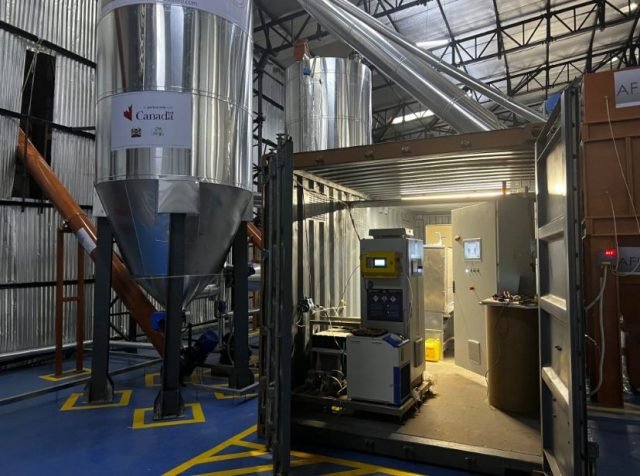The National Cereals and Produce Board (NCPB) depots, through TradeMark Africa (TMA), have been installed with aflatoxin decontamination machines to enhance food security in the region.
The Canadian government contributed CA$1.6 million (about Ksh190 million) for the purchase and installation of these decontamination units in Bungoma and Nairobi, aiming to improve safety and increase grain trade in Kenya and the broader East Africa region.
At the handover ceremony in Bungoma, Global Affairs Canada (GAC) Executive Director Marcia Colquhoun highlighted the plant’s role in facilitating the trade of essential grains and supporting food security.
“The aflatoxin decontamination plants are expected to facilitate trade in grains such as maize, sorghum, rice, oilseeds, spices, and groundnuts, thus supporting the overall goals of food security and trade facilitation in this region, particularly for small-scale and women cross-border traders,” he said.

The state-of-the-art machines, a first of their kind in commercial use in Africa, are said to have the capacity to eliminate up to 98% of aflatoxins in various food commodities, including grains, pulses, and nuts while preserving the nutritional value and integrity of the food.
Western Kenya, where maize is a primary food source for an estimated 300 million people, was deemed a strategic location to set the two large-scale decontaminators, expected to be game-changers for the region.
Bungoma County Deputy Governor Paul Ronoh indicated that over 600,000 metric tons of maize are traded annually from Uganda to Kenya and about 400,000 metric tons from Tanzania to Kenya. He said only grain meeting the acceptable aflatoxin limits, crucial for human health and safe trade, will be allowed to trade freely.
“If we are to tackle food security and food safety issues not just in Kenya but across East Africa, there is no denying that partnerships such as the one we are witnessing here today are of utmost necessity in availing modern solutions like the grain aflatoxin decontamination facilities,” said the deputy county chief
TradeMark Africa (TMA) CEO Mr. David Beer expressed optimism about the expanded trade opportunities and improved food security that the facility is expected to bring.
“This facility is potentially a game-changer. It is now possible to reduce aflatoxin contamination in grains post-harvest, thereby reducing the amount that will be rejected at the border. This will benefit both small-scale farmers and traders on the one hand and consumers such as schools, humanitarian agencies, and businesses on the other. This is part of TradeMark’s commitment to reduce trade barriers at borders,” said Beer.
The funding for this project is part of a larger CA$3 million (about Ksh 350 million) package from Canada. The remaining funds are allocated for training and creating awareness on managing aflatoxins in grain supplies for regulatory agencies, farmers, and traders in Kenya, Tanzania, and Uganda.







